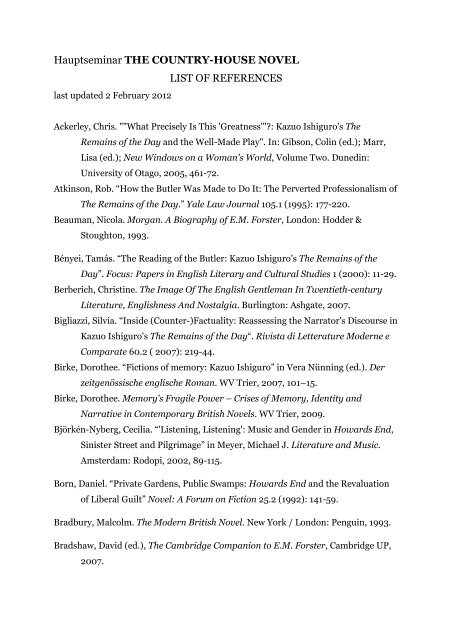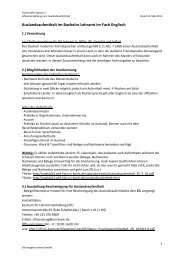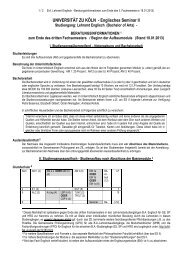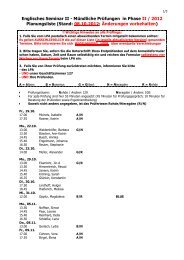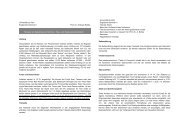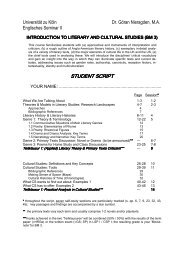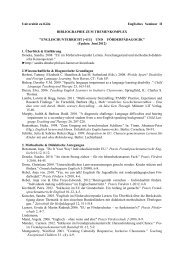Literatur Country House
Literatur Country House
Literatur Country House
You also want an ePaper? Increase the reach of your titles
YUMPU automatically turns print PDFs into web optimized ePapers that Google loves.
Hauptseminar THE COUNTRY-HOUSE NOVEL<br />
last updated 2 February 2012<br />
LIST OF REFERENCES<br />
Ackerley, Chris. ""What Precisely Is This 'Greatness'"?: Kazuo Ishiguro's The<br />
Remains of the Day and the Well-Made Play". In: Gibson, Colin (ed.); Marr,<br />
Lisa (ed.); New Windows on a Woman's World, Volume Two. Dunedin:<br />
University of Otago, 2005, 461-72.<br />
Atkinson, Rob. “How the Butler Was Made to Do It: The Perverted Professionalism of<br />
The Remains of the Day.” Yale Law Journal 105.1 (1995): 177-220.<br />
Beauman, Nicola. Morgan. A Biography of E.M. Forster, London: Hodder &<br />
Stoughton, 1993.<br />
Bényei, Tamás. “The Reading of the Butler: Kazuo Ishiguro’s The Remains of the<br />
Day”. Focus: Papers in English Literary and Cultural Studies 1 (2000): 11-29.<br />
Berberich, Christine. The Image Of The English Gentleman In Twentieth-century<br />
<strong>Literatur</strong>e, Englishness And Nostalgia. Burlington: Ashgate, 2007.<br />
Bigliazzi, Silvia. “Inside (Counter-)Factuality: Reassessing the Narrator's Discourse in<br />
Kazuo Ishiguro's The Remains of the Day“. Rivista di Letterature Moderne e<br />
Comparate 60.2 ( 2007): 219-44.<br />
Birke, Dorothee. “Fictions of memory: Kazuo Ishiguro” in Vera Nünning (ed.). Der<br />
zeitgenössische englische Roman. WV Trier, 2007, 101–15.<br />
Birke, Dorothee. Memory’s Fragile Power – Crises of Memory, Identity and<br />
Narrative in Contemporary British Novels. WV Trier, 2009.<br />
Björkén-Nyberg, Cecilia. “'Listening, Listening': Music and Gender in Howards End,<br />
Sinister Street and Pilgrimage” in Meyer, Michael J. <strong>Literatur</strong>e and Music.<br />
Amsterdam: Rodopi, 2002, 89-115.<br />
Born, Daniel. “Private Gardens, Public Swamps: Howards End and the Revaluation<br />
of Liberal Guilt” Novel: A Forum on Fiction 25.2 (1992): 141-59.<br />
Bradbury, Malcolm. The Modern British Novel. New York / London: Penguin, 1993.<br />
Bradshaw, David (ed.), The Cambridge Companion to E.M. Forster, Cambridge UP,<br />
2007.
Buck, R. A. “Dialogue and Power in E. M. Forster's Howards End” in Verdonk, Peter<br />
(ed.); Weber, Jean Jacques (ed.). Twentieth-Century Fiction: From Text to<br />
Context. London: Routledge, 1995, 63-77.<br />
Chakrabarty, Surabhi. “Forster's Howards End: Character of Margaret” Journal of<br />
the Department of English 17.1 (1981-82): 54-74.<br />
Chakrabarty, Surabhi. “Bi-Tonality in Fiction: Leonard Bast in E. M. Forster's<br />
Howards End” Journal of the Department of English 17.2 (1981-82): 1-25.<br />
Clarke, Stephen. “A Fine <strong>House</strong> Richly Furnished: Pemberley and the Visiting of<br />
<strong>Country</strong> <strong>House</strong>s”. Persuasions: Journal of the Jane Austen Society of North<br />
America 22 (2000): 199-217.<br />
Connor, Steven. The English Novel in History. 1950–95. London / New York:<br />
Routledge, 1996.<br />
Davis, Fred. Yearning for Yesteryear: A Sociology of Nostalgia. New York: The Free<br />
Press, 1979.<br />
Davis, Rocío G. “Imaginary Homelands Revisited in the Novels of Kazuo Ishiguro”<br />
Miscellanea: A Journal of English and American Studies 15 (1994): 139-54.<br />
Davison-Pégon, Claire. “Mrs Symons's Circuitous Routes: Tours and Detours to the<br />
Wonder of England“. In: Gallix, François (ed. and foreword); Shaffer, Brian W.<br />
(introd.). Kazuo Ishiguro: The Remains of the Day. Paris: Editions du Temps,<br />
1999, 117-33.<br />
Delany, Paul. “'Islands of money': Rentier Culture in E. M. Forster's Howards End”<br />
English <strong>Literatur</strong>e in Transition (1880-1920) 31.3 (1988): 285-96.<br />
Deutsch, David. “Reconnecting Music to Howards End: Forster's Aesthetics of<br />
Inclusion” Lit: <strong>Literatur</strong>e Interpretation Theory 21.3 (2010): 163-86.<br />
Doyle, Waddick. “Being an Other to Oneself: First Person Narration in Kazuo<br />
Ishiguro's The Remains of the Day“. L'Altérité dans la littérature et la culture<br />
du monde anglophone. Le Mans: Univ. du Maine, 1993, 70-76.<br />
Duckworth, Alistair M. "Jane Austen's Accommodations". Persuasions: Journal of<br />
the Jane Austen Society of North America 7 (1985): 67-77.<br />
Duckworth, Alistair M. “Fiction and Some Uses of the <strong>Country</strong> <strong>House</strong> Setting from<br />
Richardson to Scott”. In: Hahn, H. George (ed. and preface). The <strong>Country</strong><br />
Myth: Motifs in the British Novel from Defoe to Smollett. Frankfurt: Peter<br />
Lang, 1990, 221– 54.
Duckworth, Alistair M. (ed.). Howards End. Boston: Bedford, 1997.<br />
Egbert, Marie-Luise. Garten und Englishness in der englischen <strong>Literatur</strong>.<br />
Heidelberg: Winter, 2006.<br />
Ekelund, Bo G. “Misrecognizing History: Complicitous Genres in Kazuo Ishiguro's<br />
The Remains of the Day“. International Fiction Review 32.1-2 (2005): 70-90.<br />
Finkelstein, B.B. Forster’s Women: Eternal Differences. New York / London:<br />
Columbia UP, 1975.<br />
Firchow, Peter E. “Germany and Germanic Mythology in Howards End”<br />
Comparative <strong>Literatur</strong>e 33.1 (1981): 50-68.<br />
Ford, Susan Allen. "Stately Homes of England: Robert Barnard's <strong>Country</strong> <strong>House</strong><br />
Mysteries" Clues: A Journal of Detection 23.4 (2005): 3-14.<br />
Franklin, Jill. “Troops of Servants: Labour and Planning in the <strong>Country</strong> <strong>House</strong> 1840-<br />
1914.” Victorian Studies 19 (1975): 211-39.<br />
Gill, Richard. Happy Rural Seat: The English <strong>Country</strong> <strong>House</strong> and the Literary<br />
Imagination. New Haven / London: Yale UP, 1972.<br />
Girouard, Mark. Life in the English <strong>Country</strong> <strong>House</strong>: A Social and Architectural<br />
History. New Haven: Yale UP, 1978.<br />
Goetsch, Paul. “The English <strong>Country</strong>-<strong>House</strong> Novel, 1914–1945: From Ford to<br />
Waugh”. In: Ansgar & Vera Nünning (ed.). Klassiker und Strömungen des<br />
englischen Romans im 20. Jahrhundert. WV Trier, 2000, 15–30.<br />
Goldman, Jane. “Forster and Women” in: Bradshaw 2007, 120–37.<br />
Graham, Peter W. "From Mansfield Park to Gosford Park: The English <strong>Country</strong><br />
<strong>House</strong> from Austen to Altman". Persuasions: Journal of the Jane Austen<br />
Society of North America 24 (2002): 211-25.<br />
Griffiths, M. “Great English <strong>House</strong>s/New Homes in England?: Memory and Identity<br />
in Kazuo Ishiguro's The Remains of the Day and V. S. Naipaul's The Enigma of<br />
Arrival“. SPAN: Journal of the South Pacific Association for Commonwealth<br />
<strong>Literatur</strong>e and Language Studies 36 (1993): 488-503.<br />
Gurewich, D. “Upstairs/Downstairs”. The New Criterion 8.4 (1989): 77-80.<br />
Guth, Deborah. “Submerged Narratives in Kazuo Ishiguro's The Remains of the Day”<br />
Forum for Modern Language Studies 35.2 (1999): 126-37.<br />
Hardy, Barbara. “The Objects in Mansfield Park” in: Halperin, John (ed.), Jane<br />
Austen. Bicentenary Essays. Cambridge: UP, 1975, 180–96.
Hardy, Barbara. “Properties and Possession in Jane Austen’s Novels” in: McMaster,<br />
Juliet (ed.) Jane Austen’s Achievement. Houndmills: Macmillan, 1976.<br />
Harris, John. The Design of the English <strong>Country</strong> <strong>House</strong>, 1620-1920. London: Trefoil,<br />
1985.<br />
Hatano, Yoko. "Fanny Price and Molly Gibson: Bearers of the <strong>Country</strong> <strong>House</strong><br />
Tradition". Gaskell Society Journal 10 (1996): 92-101.<br />
Head, Dominic. The Cambridge Introduction to Modern British Fiction, 1950–2000.<br />
Cambridge UP, 2002.<br />
Henke, Christoph. “Remembering Selves, Constructing Selves: Memory and Identity<br />
in Contemporary British Fiction“ Journal for the Study of British Cultures 10.1<br />
(2003): 77-100.<br />
Herz, Judith Scherer (ed. & introd.); Martin, Robert K. (ed.) E. M. Forster:<br />
Centenary Revaluations. Toronto: U of Toronto P, 1982.<br />
Horn, Pamela. The Rise and Fall of the Victorian Servant. Dublin: Gill & Macmillan,<br />
1975.<br />
Iyer, Pico. “The Remains of the Day” Partisan Review 58/3 (1991): 585-89.<br />
Jenkins, Hugh. Feigned Commonwealths: The <strong>Country</strong>-<strong>House</strong> Poem and the<br />
Fashioning of the Ideal Community. Pittsburgh: Duquesne UP, 1998.<br />
Karschay, Stephan. “Only Connect! The Negotiation of Identities in E. M. Forster's<br />
Howards End and Zadie Smith's On Beauty” in Kamm, Jürgen (ed. and<br />
introd.); Sedlmayr, Gerold (ed. and introd.). Insular Mentalities: Mental Maps<br />
of Britain. Passau: Stutz, 2007, 201-13.<br />
Kazin, Alfred. “Howards End Revisited” Partisan Review 59.1 (1992): 29-43.<br />
Kelsall, Malcolm. The Great Good Place. The <strong>Country</strong> <strong>House</strong> and English <strong>Literatur</strong>e,<br />
Brighton: Harvester Wheatsheaf, 1993.<br />
Kremkau, Simone. Vergangenheit, Erinnerung und Nostalgie im englischen Roman<br />
nach 1945. Göttingen: Cuvillier, 2003.<br />
Lang, James M. “Public Memory, Private History: Kazuo Ishiguro's The Remains of<br />
the Day” CLIO: A Journal of <strong>Literatur</strong>e, History, and the Philosophy of<br />
History 29.2 (2000): 143-65.<br />
Langland, E., “Gesturing Towards an Open Space: Gender, Form, and Language in<br />
E.M. Forster’s Howards End” in L. Claridge; E. Langland (eds.). Out of
Bounds: Male Writers and Gender(ed) Criticism. Amherst: University of<br />
Massachustes Press, 1990, 252–67.<br />
Larabee, Mark Douglas. "Modernism and the <strong>Country</strong> <strong>House</strong> in Ford Madox Ford's<br />
The Good Soldier" English <strong>Literatur</strong>e in Transition, 1880-1920, 53.1 (2010):<br />
75-94.<br />
Lewis, Barry. Kazuo Ishiguro. Manchester UP, 2000.<br />
Littlejohn, David. The Fate of the English <strong>Country</strong> <strong>House</strong>. New York: Oxford UP,<br />
1997.<br />
Lodge, David. “The Unreliable Narrator (Kazuo Ishiguro)” in: D. Lodge. The Art of<br />
Fiction. London: Penguin, 1992, 154–7.<br />
Löschnigg, Martin. "History and the Search for Identity: Reconstructing the Past in<br />
Recent English Novels" <strong>Literatur</strong> in Wissenschaft und Unterricht 29.2 (1996):<br />
103–19.<br />
Lucas, John. “The Sunlight on the Garden” in: Kaplan, Carola M. (ed.); Simpson,<br />
Anne B. (ed.). Seeing Double: Revisioning Edwardian and Modernist<br />
<strong>Literatur</strong>e. New York: St. Martin's, 1996, 59–77.<br />
Luyat, Anne. “Myth and Metafiction: Is Peaceful Co-Existence Possible? Destruction<br />
of the Myth of the English Butler in Kazuo Ishiguro's The Remains of the Day"<br />
in Duperray, Max (ed.). Historicité et métafiction dans le roman<br />
contemporain des Iles Britanniques. Aix-en-Provence: Univ. de Provence,<br />
1994. 183–96<br />
MacDougall, Elisabeth Blair (ed.). The Fashioning and Functioning of the British<br />
<strong>Country</strong> <strong>House</strong>. Hanover: UP of New England, 1989.<br />
Mallett, Peter J. “The Revelation of Character in Kazuo Ishiguro's The Remains of the<br />
Day and An Artist of the Floating World” Shoin Literary Review 29 (1996): 1–<br />
20.<br />
Maroon, Fred J., Girouard, Mark (introd.). The English <strong>Country</strong> <strong>House</strong>: A Tapestry<br />
of Ages. Charlottesville: Thomasson-Grant, 1987.<br />
Mason, Gregory. "An Interview with Kazuo Ishiguro" Contemporary <strong>Literatur</strong>e 30.3<br />
(1989): 335–47.<br />
Mathur, Piyush, “The Archigenderic Territories: Mansfield Park and A Handful of<br />
Dust” Women's Writing 5,1 (1998): 71–80.<br />
McCombe, John P. “The end of (Anthony) Eden: Ishiguro’s The Remains of the Day<br />
and mid-century Anglo-American tensions” Twentieth-Century <strong>Literatur</strong>e 48<br />
(2002): 77–99.
McDonough, Donald. “Off with Their Heads: The British Novel and the Rise of<br />
Fascism“ Tennessee Philological Bulletin: Proceedings of the Annual Meeting<br />
of the Tennessee Philological Association 33 (1996): 34–42.<br />
Medalie, David. “'What Dignity Is There in That?': The Crisis of Dignity in Selected<br />
Late-Twentieth-Century Novels” Journal of Literary Studies/Tydskrif vir<br />
Literatuurwetenskap 20.1-2 (2004): 48–61.<br />
Mergenthal, Silvia. A Fast-Forward Version of England. Constructions of<br />
Englishness in Contemporary Fiction. Heidelberg: Winter, 2003.<br />
Messenger, Nigel. How to Study an E.M. Forster Novel. Houndmills: Macmillan,<br />
1991.<br />
Mizhou. “Fiction as Musicology: Aesthetic Listening in E. M. Forster's Howards End”<br />
Forum for Modern Language Studies 47.3 (2011): 237-50.<br />
Multhaup, Uwe. "'Money, Manors and Manners': Landes- und kulturkundliche<br />
Aspekte des englischen <strong>Country</strong> <strong>House</strong>" Anglistik & Englischunterricht 37<br />
(1989): 155–79.<br />
Newlands, Carole E. "Statius' Villa Poems and Ben Jonson's To Penshurst: The<br />
Shaping of a Tradition" Classical and Modern <strong>Literatur</strong>e: A Quarterly 8.4<br />
(1988): 291–300.<br />
Niederhoff, Burkhard. “E. M. Forster and the Supersession of Plot by Leitmotif: A<br />
Reading of Aspects of the Novel and Howards End” Anglia: Zeitschrift fur<br />
Englische Philologie 112.3-4 (1994): 341-63.<br />
Nünning, Ansgar (ed.). Unreliable Narration. Studien zur Theorie und Praxis<br />
unglaubwürdigen Erzählens in der englischsprachigen Erzählliteratur. WV<br />
Trier, 1998.<br />
Nünning, Ansgar. “Die Synthese aus Tradition und Innovation im englischen Roman<br />
der 1980er und 1990er Jahre: Die Rückkehr zum Erzählen bei Graham Swift,<br />
Kazuo Ishiguro und Barry Unsworth“ in: Ansgar & Vera Nünning (Hg.).<br />
Klassiker und Strömungen des englischen Romans im 20. Jahrhundert. WV<br />
Trier, 2000, 189–217.<br />
O’Brien, Susie. “Serving a new world order: postcolonial politics in Kazuo Ishiguro’s<br />
The Remains of the Day” Modern Fiction Studies 42 (1996): 787–806.<br />
Olson, Jeane N. “E. M. Forster's Prophetic Vision of the Modern Family in Howards<br />
End” Texas Studies in <strong>Literatur</strong>e and Language 35.3 (1993): 347-62.
Outka, Elizabeth. “Buying Time: Howards End and Commodified Nostalgia” Novel:<br />
A Forum on Fiction 36.3 (2003): 330-50.<br />
Parkes, A. Kazuo Ishiguro’s “The Remains of the Day”. New York: Continuum<br />
Contemporaries, 2001.<br />
Parry, Sarah. "The Pemberley Effect: Austen's Legacy to the Historic <strong>House</strong> Industry"<br />
Persuasions 30 (2008): 113–22.<br />
Patey, Caroline. "When Ishiguro Visits the West <strong>Country</strong>, An Essay on The Remains<br />
of the Day" Acme 44.2 (1991): 135–55.<br />
Poettgen, Heinz. "Die geschichtliche Entwicklung des gentleman-Ideals" Die Neueren<br />
Sprachen 2 (1952): 71–81.<br />
Poettgen, Heinz. "Das englische gentleman-Ideal in der Gegenwart" Die Neueren<br />
Sprachen 10 (1952): 424–31.<br />
Pohl, Nicole. “'And Is Not Every Manor a Little Common Wealth?' Nostalgia, Utopia<br />
and the <strong>Country</strong> <strong>House</strong>” in: Pordzik, Ralph (ed. and introd.). Futurescapes:<br />
Space in Utopian and Science Fiction Discourse. Amsterdam: Rodopi, 2009,<br />
131–70.<br />
Rauchbauer, Otto. “Das englische '<strong>Country</strong> <strong>House</strong>' als Modell für eine integrative<br />
Landskunde: Eine Skizze und ein Forschungsüberblick“ in Arbeiten aus<br />
Anglistik und Amerikanistik 9.2 (1984): 157–70.<br />
Robbins, Keith. The Eclipse of a Great Power. Modern Britain 1870–1992.<br />
London/New York: Longman, 1983.<br />
Roby, Kinley E. “Irony and the Narrative Voice in Howards End” Journal of<br />
Narrative Technique 2 (1972): 116-24.<br />
Rothfork, John. “Zen Comedy in Postcolonial <strong>Literatur</strong>e: Kazuo Ishiguro's The<br />
Remains of the Day” Mosaic: A Journal for the Interdisciplinary Study of<br />
<strong>Literatur</strong>e 29.1 (1996): 79–102.<br />
Scherzinger, Karen. “The Butler in (the) Passage: The Liminal Narrative of Kazuo<br />
Ishiguro's The Remains of the Day” Literator: Tydskrif vir Besondere en<br />
Vergelykende Taal- en Literatuurstudie/Journal of Literary Criticism,<br />
Comparative Linguistics and Literary Studies 25.1 (2004): 1–21.<br />
Schonebeck, O. The visions of the fact. Text und Fiktion in den Romanen von Ian<br />
Banks, Kazuo Ishiguro, Martin Amis und Jeanette Winterson. WV Trier,<br />
2000.<br />
Shaffer, Brian W. Understanding Kazuo Ishiguro. Columbia UP, 1998.
Slavicek, L.C. The Treaty of Versailles. New York: Infobase, 2010.<br />
Stiebritz, Andrea. Figuren und Figurenwelten. Eine Untersuchung Zum Erzählwerk<br />
von Jane Austen und Charles Dickens. WV Trier, 2009.<br />
Stone, Wilfried. The Cave and the Mountain: A Study of E.M. Forster. Stanford UP,<br />
1966.<br />
Su, John J. “Refiguring national character: the remains of the British estate novel”<br />
Modern Fiction Studies 48 (2002): 552–80.<br />
Su, John J. Ethics and Nostalgia in the Contemporary Novel. Cambridge UP, 2005.<br />
Sucher, S. J. The Moral Leader: Challenges, Insights, and Tools. New York:<br />
Routledge, 2008.<br />
Tamaya, Meera. “Ishiguro’s Remains of the Day: the empire strikes back” Modern<br />
Language Studies 22 (1992): 45–56.<br />
Tambling, Jeremy (ed.). New Casebooks: E.M. Forster, Basingstoke: Macmillan,<br />
1995.<br />
Terestchenko, Michel. “Servility and Destructiveness in Kazuo Ishiguro's The<br />
Remains of the Day“ Partial Answers: Journal of <strong>Literatur</strong>e and the History<br />
of Ideas 5.1 (2007): 77–89.<br />
Thompson, Douglas H. “From Words to Things: Margaret’s progress in Howards<br />
End” Studies in the Novel 15.2 (1983): 122-34.<br />
Trimm, Ryan S. “Inside Job: Professionalism and Postimperial Communities in The<br />
Remains of the Day“ Lit: <strong>Literatur</strong>e Interpretation Theory 16.2 (2005): 135–<br />
61.<br />
Trimm, Ryan. “Telling Positions: <strong>Country</strong>, <strong>Country</strong>side, and Narration in The<br />
Remains of the Day” Papers on Language and <strong>Literatur</strong>e: A Journal for<br />
Scholars and Critics of Language and <strong>Literatur</strong>e 45.2 (2009): 180–211.<br />
Turner, Henry S. “Empires of Objects: Accumulation and Entropy in E. M. Forster's<br />
Howard End” Twentieth Century <strong>Literatur</strong>e: A Scholarly and Critical<br />
Journal 46.3 (2000): 328-45.<br />
Veyret, Paul. “The Strange Case of the Disappearing Chinamen: Memory and Desire<br />
in Kazuo Ishiguro's The Remains of the Day and When We Were Orphans”<br />
Etudes Britanniques Contemporaines: Revue de la Société d'Etudes Anglaises<br />
Contemporaines 29 (2005): 159–72, 181f.
Vorda, Alan. "Stuck on the Margins: An Interview with Kazuo Ishiguro" in: Alan<br />
Vorda (ed.). Face to Face: Interviews with Contemporary Novelists. Houston:<br />
Rice UP, 1993, 1–35.<br />
Wainwright, Valerie. Ethics and the English Novel from Austen to Forster.<br />
Aldershot: Ashgate, 2007.<br />
Wall, Kathleen. "The Remains of the Day and its Challenges to Theories of Unreliable<br />
Narration" Journal of Narrative Technique 24.1 (1994): 18–42.<br />
Westerman, Molly. “Is the Butler Home? Narrative and the Split Subject in The<br />
Remains of the Day“ Mosaic: A Journal for the Interdisciplinary Study of<br />
<strong>Literatur</strong>e 37.3 (2004): 157–70.<br />
White, Leslie. “Vital Disconnection in Howards End“ Twentieth Century <strong>Literatur</strong>e:<br />
A Scholarly and Critical Journal 51.1 (2005): 43-63.<br />
Whyte, Philip. “The Treatment of Background in Kazuo Ishiguro's The Remains of the<br />
Day” Commonwealth Essays and Studies 30.1 (2007): 73–82.<br />
Widdowson, Peter. E.M. Forster’s Howards End: Fiction as History. London:<br />
Chatto, 1977.<br />
Wilde, Alan. Art and Order: A Study of E.M. Forster. New York UP, 1964.<br />
Wiltse, Ed. “Teaching Howards End to the Basts: Class Markers in the Classroom,<br />
and in the Bourgeois Novel” Radical Teacher: A Socialist, Feminist, and Anti-<br />
Racist Journal on the Theory and Practice of Teaching 68 (2003): 5-9.<br />
Winsworth, Ben. “Communicating and Not Communicating: The True and False Self<br />
in The Remains of the Day“. Q/W/E/R/T/Y: Arts, Littératures & Civilisations<br />
du Monde Anglophone 9 (1999): 259–66.<br />
Womack, Kenneth. “'Only Connecting' with the Family: Class, Culture, and Narrative<br />
Therapy in E. M. Forster's Howards End” Style 31.2 (1997): 255-69.<br />
Wong, Cynthia F. Kazuo Ishiguro. Tavistock: Northcote <strong>House</strong>, 2000.<br />
Wong, Cynthia F. “Kazuo Ishiguro's The Remains of the Day”. Shaffer, Brian W.<br />
(ed.); A Companion to the British and Irish Novel, 1945-2000. Malden:<br />
Blackwell, 2005, 493–503.<br />
Youngjoo, Kim. Revisiting the great good place: The country house, landscape and<br />
Englishness in twentieth-century British fiction. Diss. Texas University, 2002.


